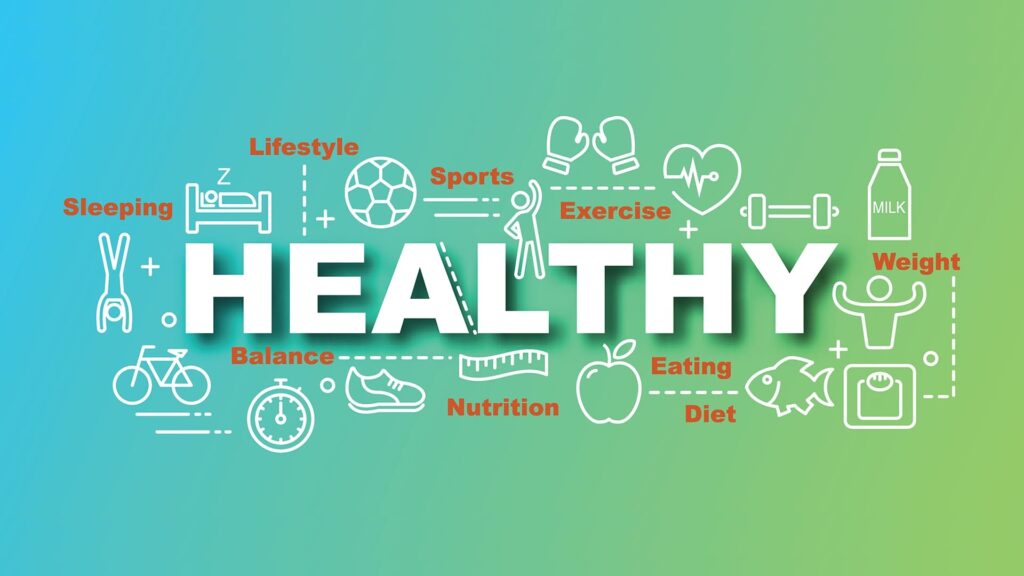Health & Wellness is a comprehensive condition of well-being that includes physical, mental, emotional, and social well-being besides the absence of disease. Wellness is an active, continuous process of making thoughtful decisions to live a happy and balanced life, whereas health is the state of the body and mind. Together, they highlight how to integrate mental clarity, emotional resilience, physical fitness, healthy eating, and deep connections to enable people to reach their greatest potential.
Being physically, psychologically, and emotionally well is more important in Holistic health. Many people despite knowing the importance of health don’t place it in the top ranks in their life.
You should not need to be motivated to take care of your health. It must be a top priority.
8 dimensions of health & wellness

The 8 dimensions of health and wellness offer a thorough foundation for living a happy, balanced life.
True well-being is multifaceted, as verified by the eight dimensions of health and wellness. You can live a life that is balanced, harmonic, and satisfying by concentrating on each aspect. No one can do well by over-emphasizing one aspect and neglecting another. It is a completely necessary package.
1. Physical Wellbeing
- This dimension emphasizes preserving physical health with consistent exercise, a good diet, enough sleep, and precautionary medical treatment.
- It includes controlling long-term illnesses and cutting back on bad habits like smoking and binge drinking.
Walking every day, maintaining a healthy diet, and making time for routine checkups are a few examples.
2. Emotional and Mental Health
- This Health & Wellness dimension involves controlling feelings, handling stress, and keeping an optimistic attitude.
- It emphasizes self-awareness, emotional intelligence, and asking for help when necessary for Holistic health.
For instance, writing, mindfulness exercises, and going to therapy when feeling overwhelmed.
3. Well-being of the Mind
- This stimulates the mind by promoting critical thinking, creativity, and ongoing learning.
- It entails keeping an open mind, learning new abilities, and engaging in hobbies.
For instance, reading literature, enrolling in classes, or working through riddles.
4. Well-being in Society
- This Health & Wellness dimension has to do with creating a supportive social network and deep connections.
- It includes being empathetic, communicating effectively, and giving back to the community.
Examples: Volunteering, joining a group, or spending time with loved ones.
5. Spiritual Well-Being
- This Holistic Health approach Involves looking for meaning, purpose, and correspondence with one’s values or views.
- It includes routines like prayer, meditation, and spending time in nature.
Examples include investigating one’s ideals, going to spiritual events, or cultivating an attitude of gratitude.
6. Workplace Wellbeing
- This Health & Wellness dimension refers to striking a healthy work-life balance while finding contentment and balance in one’s everyday activities or at work.
- It focuses on achieving fulfilling and significant career goals.
For instance, setting boundaries to avoid burnout or picking a career that fits your Holistic Health Values.
7. Well-being of the Environment
- This focuses on establishing a sustainable and healthy environment for both you and other people.
- It consists of conserving resources, maintaining a clean environment, and enjoying the natural world.
For instance, recycling, using less plastic, or maintaining an orderly living area.
8. Well-being in terms of finances
- This Health & Wellness dimension involves attaining financial security and efficiently managing resources to lessen financial stress.
- It includes setting up a budget, saving money, and making plans for the future.
For instance: setting up an emergency fund, making a budget, or getting financial guidance.
Physical Wellbeing: The Basis of Health & Wellness

A healthy and satisfying existence is based on achieving and preserving physical health. It’s not just about staying healthy; it’s also about feeling powerful, energized, and prepared to face life’s obstacles. Your quality of life can be significantly enhanced by incorporating healthy behaviors into your everyday routine.
Healthy Routines for Everyday Life and Holistic Health
- The Value of Maintaining an Active Lifestyle for Health & Wellness
Physical health requires movement. Frequent exercise strengthens bones and muscles, promotes cardiovascular health, and enhances mental health by elevating endorphins and lowering stress. There are distinct advantages to various types of exercise:
Walking: A low-impact activity that is accessible to most individuals and enhances cardiovascular health.
Yoga: Reduces stress and increases strength, flexibility, and mindfulness.
High-intensity interval training, or HIIT, is a quick workout that increases metabolism, burns calories, and increases endurance.
2. Fundamentals of Nutrition
The foundation of Holistic health is nutrition. Your body gets the energy and nutrition it needs to operate at its best when you eat a range of entire meals that are high in nutrients.
Whole Foods: Give special attention to fruits, vegetables, lean meats, whole grains, and good fats.
Make sure you get a healthy balance of fats, proteins, and carbs.
Hydration: Maintaining proper hydration improves energy levels, digestion, and cellular function in general.
3. Healing and Rest
Just as important as nutrition and exercise are sleep and rest for Health & Wellness. Your immune system strengthens, your brain solidifies memories, and your body heals itself as you sleep. Numerous health problems, such as reduced immunity, weight gain, and mental exhaustion, can result from chronic sleep deprivation.
Useful Advice for Developing Healthful Habits

- Every day, try to get in 30 minutes of exercise.
- Divide it up: two 15-minute yoga sessions or three 10-minute walks are equally effective.
- To stay motivated, include things you enjoy doing, like skipping, hiking, or cycling.
- Create a Bedtime Schedule
- You may control your body’s internal clock by going to bed at the same hour every night, including on the weekends.
- Establish a relaxing bedtime regimen that includes reading or meditation, avoiding screens, and lowering the lights.
- Maintain a calm, dark, and chilly bedroom to produce the ideal sleeping environment.
You can build a strong foundation for your Health & Wellness by continuing to be active, eating healthily, and making relaxation a priority. You will be able to feel better, perform better, and have a greater quality of life with these easy yet effective behaviors.
Holistic health: Taking Care of Your Inner World for Mental Health
The foundation of general well-being is mental health. It affects our thoughts, feelings, and interactions with the outside environment and includes our emotional, psychological, and social well-being. We can cultivate a healthier and balanced mental state by recognizing typical problems, increasing self-awareness, and using stress-reduction strategies.
Identifying Stress, Anxiety, and Depression
1. Gaining an Understanding of Mental Wellness
Today, stress, anxiety, and depression are some of the most prevalent mental health issues.
Stress: A normal reaction to pressure, stress can inspire us but can also be detrimental if it persists or gets too much.
Anxiety: An constant anxiety or concern that can get in the way of day-to-day activities.
Depression is a type of mood disorder marked by depressive, gloomy, or disinterested feelings.
The first step in treating these disorders is acknowledging them. Fatigue, trouble focusing, or bodily symptoms like tension and headaches are some examples of symptoms.
Health & Wellness: The Relationship between Physical and Mental Health
Physical and mental well-being is closely related. Physical conditions like high blood pressure, decreased immunity, and sleep difficulties can result from long-term stress and poor mental health. On the other hand, healthy eating and regular exercise can improve mood and cognitive abilities.
Stress Reduction & Mindfulness
1. Mindfulness Practice
Being completely present in the moment without passing judgment is a component of mindfulness. It promotes emotional resilience, enhances focus, and lessens stress.
Breathing exercises: The nervous system can be calmed by simple techniques like box breathing, which involves inhaling for four counts, holding for four, and exhaling for four.
Journaling: Putting your ideas or expressions of thankfulness on paper can help you focus on the good and make sense of your feelings.
2. Turning off Technology
Overstimulation and stress are worsened by excessive screen time and continual connectivity. Adopting “slow living” enables you to take your time, enjoy the present, and give priority to important events.
Set aside time for “tech-free” times and restrict your use of social media.
Take part in offline pursuits such as reading, handicraft, or hiking.
Useful Advice for Mental Health
Begin by practicing mindfulness for five minutes each day.
Just five minutes a day should be dedicated to deep breathing, meditation, or introspection. As it becomes second nature, gradually extend the duration.
Discuss Your Feelings with a Professional or Friend
Talking to a trustworthy friend or therapist about your feelings and thoughts can help you see things differently and relieve mental stress.
Take brief breaks while working.
Take a little break from your workstation every hour. To clear your head, stretch, take long breaths, or just close your eyes.
Emotional Health: Developing Joy and Resilience
The capacity to handle life’s ups and downs with strength, happiness, and a sense of direction is known as emotional well-being. It entails being aware of your feelings, forming deep connections, and developing positive behaviors. You can design a more balanced and satisfying life by emphasizing emotional intelligence and thankfulness.
The Development of Emotional Intelligence
1. Recognizing Your Feelings and the Influence of Self-Awareness
Recognizing and comprehending your emotions is the first step towards developing emotional intelligence (EQ) in Health & Wellness. Being self-aware enables you to recognize your feelings and the reasons behind them, enabling you to react deliberately rather than hastily.
You can monitor emotional trends by keeping a journal of your thoughts.
Your capacity to remain in the moment with your emotions is improved by mindfulness exercises.
2. Using Communication and Empathy to Manage Relationships
Clear communication, active listening, and empathy are the foundation of healthy partnerships.
Empathy: Make an effort to understand other people’s viewpoints and validate their emotions.
Communication: Get better at politely but assertively communicating your wants and feelings.
In both personal and professional relationships, cultivating these abilities can result in stronger bonds and less conflict.
Useful Advice for Emotional Health & Wellness:
List Three Things Every Day for Which You Are Thankful
Write down things that make you happy or that you value in a notepad or an app. This practice gradually rewires your brain to emphasize the good things in life.
Establish Healthy Limits to Preserve Your Emotional Vitality
Learn to refuse without feeling guilty. Put your best interests and relationships first, and avoid those who exhaust you.
Volunteer or Contribute
Assisting others fosters a feeling of connection and purpose. It might be as easy as helping a buddy in need or volunteering your time to a local cause.
Avoiding negative emotions is not the goal of emotional well-being; rather, it is about developing the skills necessary to deal with them gracefully and resiliently. You can develop greater joy and emotional balance by improving your emotional intelligence, being grateful and establishing limits. Even seemingly insignificant daily activities can have significant long-term effects.
Social Wellbeing: The Influence of Relationships in Health & Wellness
The ability to cultivate deep connections and engage in peaceful interactions in a variety of communities is known as social wellbeing. Good social relationships contribute to a feeling of purpose and belonging while improving mental, emotional, and even physical health. Your general well-being can be enhanced by cultivating relationships and building a network of supporting people.
Why Connections Are Important
1. How Healthy Relationships Affect Health
Numerous health advantages are associated with strong social ties:
Mental Health: Relationships that are supportive lower stress, anxiety, and the chance of developing depression.
Physical Health: Research indicates that connected people have healthier immune systems, reduced blood pressure, and longer life expectancies.
Emotional Support: Friends and family build resilience by acting as a safety net in trying circumstances.
2. Handling Toxic Connections
Although healthy relationships improve our lives, poisonous ones can sap our emotional reserves and undermine our self-worth.
Identify toxic conduct by looking for indicators like unrelenting criticism, manipulation, or a lack of support.
Clearly define your boundaries or, if needed, cut off toxic relationships.
Make reciprocal, uplifting, and respectful interactions your priority.
Useful Advice for Improving Social Wellbeing: Make Time for Your Loved Ones Often
Spending quality time creates enduring memories and improves relationships.
Engage in Active Listening in Conversations
Put aside distractions like phones and other electronics to be present.
By keeping eye contact, nodding, and posing intelligent queries, you can establish active listening.













